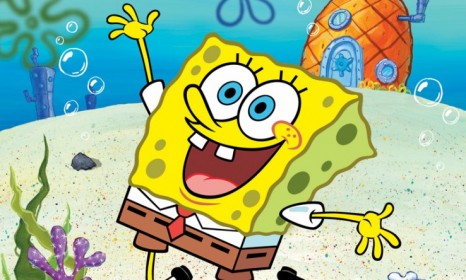Top 6 SpongeBob SquarePants controversies
Recent accusations that the animated series hinders preschoolers' attention spans caps off a history of scandals for the 12-year-old Nickelodeon cartoon

A free daily email with the biggest news stories of the day – and the best features from TheWeek.com
You are now subscribed
Your newsletter sign-up was successful
For a cartoon sponge who lives in a pineapple under the sea, SpongeBob SquarePants lives a remarkably controversial life. In their 12-year run, the character and his Nickelodeon animated series have come under attack for everything from alleged hidden political agendas to sexy commercials. Now, the American Academy of Pediatrics is claiming that the show may even be hazardous to a child's ability to learn. How does the scandal stack up against other SpongeBob controversies? Here's a look at the six biggest:
1. Is SpongeBob gay?
In 2002, series creator Stephen Hillenburg countered rumors that SpongeBob SquarePants is gay, saying the character is "somewhat asexual." But the questions persist. The evidence: His best friend is an "ebullient pink starfish" named Patrick; his neighbor Squidward takes bubble baths, listens to classical music, and "talks like Paul Lynde"; and SpongeBob and Patrick occasionally hold hands while watching a TV show called The Adventures of Mermaid Man and Barnacle Boy. "You do the math, folks," says the Gay Financial Network.
The Week
Escape your echo chamber. Get the facts behind the news, plus analysis from multiple perspectives.

Sign up for The Week's Free Newsletters
From our morning news briefing to a weekly Good News Newsletter, get the best of The Week delivered directly to your inbox.
From our morning news briefing to a weekly Good News Newsletter, get the best of The Week delivered directly to your inbox.
2. If not, he may still "make you gay"
A 2005 music video that used SpongeBob and other popular children's characters to promote diversity and tolerance was attacked by James Dobson, founder of the right-wing Christian group Focus on the Family, for being a vehicle for pro-gay propaganda. Dobson singled out SpongeBob because of his popularity among gay men. Nile Rodgers, founder of the We Are Family Foundation, which released the video, said that anyone who thought it promoted homosexuality "needs to visit their doctor and get their medication increased."
3. And also make you fat
A report released in 2005 found compelling evidence that linked the rise of childhood obesity in the U.S. to television ads for snack foods that starred children's characters, including Mr. SquarePants. The report called for Congress to mandate that advertisers stop using the characters to advertise unhealthy products. That means, said Marian Burros at The New York Times, "SpongeBob would probably have to drop the Pop Tarts" from his litany of sponsorship deals.
A free daily email with the biggest news stories of the day – and the best features from TheWeek.com
4. A Burger King ad starring the character was "too sexy"
The Campaign for a Commercial Free Childhood complained about "sexualized images" in a 2009 Burger King commercial that used SpongeBob to promote its kids meal, saying the ad objectified women. A parody of '90s rapper Sir Mix-a-Lot's music video "Baby Got Back," the commercial changed the song's opening lyric, "I like big butts, and I cannot lie…" to "I like square butts…" The music video is filled with "sexy gyrating women;" the commercial's dancers wear pants with phone books stuffed in them to make them look square. It's hard to tell if it's too sexy, says Maria Andreu at NJ.com, or "too silly."
5. The show pushed a global warming agenda based on "unproven science"
In August, the hosts of Fox News' Fox and Friends argued that a book based on the SpongeBob series titled SpongeBob Goes Green! pushed a climate change agenda based on "unproven science." The book explores the role of human emissions (or, in this case, SpongeBob and Mr. Krab's emissions) of carbon dioxide on global warming. Argued host Steve Doocy: "The big question is is it man-made" or just a "climatic phase." Yet, "scientists have repeatedly found that human activity is directly linked to climate change," said Tanya Somander at Think Progress. Apparently a cartoon children's book is "more familiar with fact than Fox News hosts."
6. The show ruins kids' concentration
On Monday, the American Academy of Pediatrics published a study concluding that SpongeBob SquarePants and similar kids' cartoons are too fast-paced and aren't good for children. The "frenetic pace" of scene changes in SpongeBob episodes, researchers say, hinders preschoolers' attention spans and concentration. In the show's defense, Nickelodeon vice president Jane Gould said the researchers should have used a different show, because SpongeBob isn't intended for preschoolers. "It made me scratch my head and feel confused," says Gould, as quoted by ABC News. SpongeBob is "designed to entertain 6-to-11-year-olds."